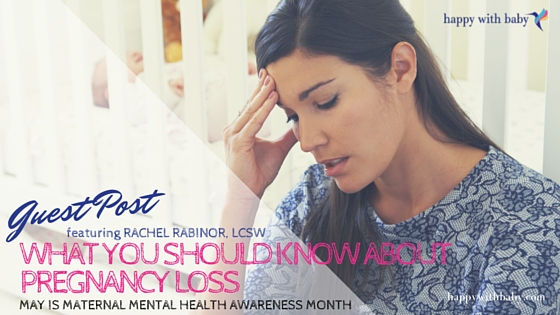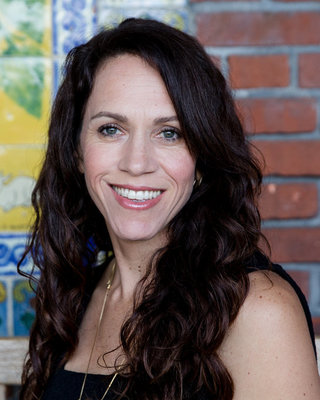Guest Blog: What You Should Know About Pregnancy Loss

IN HONOR OF MATERNAL MENTAL HEALTH AWARENESS MONTH THIS MAY, WE WILL BE FEATURING GUEST BLOGGERS, EACH OF WHOM BRING THEIR OWN UNIQUE EXPERTISE AND PERSPECTIVE TO THE DISCUSSION. IT IS MY HOPE TO HELP EDUCATE AND NORMALIZE THE EXPERIENCES OF ALL MOMS.
Guest Blog Post: What You Should Know About Pregnancy Loss
By Rachel Rabinor, LCSW
When a woman loses a pregnancy, her baby, life changes forever in ways most will thankfully never understand. She’s joined a club that no one wants to be in and she finds herself walking a solitary path into the future.
As a society, we don’t talk much about perinatal loss, and thus most of us are uneducated or undereducated about it’s dramatic and often traumatic impact. Because talking about it makes people uncomfortable, when it happens, women are often left to suffer in silence, awaiting the unknown.
Infertility, loss and trauma are risk factors for developing a perinatal mood or anxiety disorder, such as anxiety or depression, but most women don’t know this. We’re told that miscarriage is common, but that doesn’t mean we’re prepared for when it happens.
Community Support and Awareness
There are things professionals and caring individuals can do to support clients, patients, friends and loved ones. In addition to supportive nonjudgmental words, empathic listening and helpful things friends and family can do like bring dinner, watch older children, and just show up, we as a community have the capacity to help women prepare for and anticipate what lies ahead during and after a loss.
We need to support and rely on one another like the tight knit village of women that sustained our ancestors.
We all too often live isolated lives and struggle and suffer in silence. We can do better!
May is Maternal Mental Health Awareness Month. It’s an opportunity for us to contemplate the mental health of mothers, raise awareness and take action for improving the care they receive.
I’ve worked with perinatal women since 2008 and have been deeply impacted by the clients I’ve served and the women I’ve met who struggle with infertility and perinatal loss.
Learning from our Sisters
In an effort to raise awareness this May, I share their voices; these words are from real women who’ve endured perinatal loss. Hopefully, you will gain a better understanding of what it’s like to experience perinatal loss, and be encouraged to think about your approach to supporting important women in your life and how together we can educate others about the importance of maternal mental health.
It’s my hope that you will never need this information personally, but if you do, please remember that everyone’s experience is different. The hope is that knowing a little bit more about what you might expect will make your experience and recovery easier, if ever so slightly.
"What surprised me most after I lost a pregnancy at 14 weeks was the expectation to look good even though I didn’t feel good. Physically my body was a wreck. I was nauseous for 8 weeks. Every single day. Then I found out the pregnancy wasn’t viable; my baby wasn’t alive and I was STILL nauseous. I had labor pains all night long as I miscarried. This speaks nothing of my emotional state."
"I didn’t feel prepared for the physical experience of having a (natural) miscarriage. My doctor put me on bed-rest for bleeding and told me to come back in three weeks. I had no idea what to look for. She could have let me know what I *might* experience. I wish she had highlighted the benefits of a D&C for testing purposes."
"I could have benefited from more information about what to expect when miscarrying. With my last one I was given some pills to go into labor but was at home when I did. My baby was 16 weeks along and I literally held him in my hand not knowing what to do with myself. I was told to take some ibuprofen for the physical pain, which did nothing by the way, but the emotional pain—not a word from my doctor. Even just some words like: it might be intense. You’ll see a lot of tissue and might recognize parts of the fetus. I had no idea what to expect when delivering at home. Alone."
"I wish I had reached out for emotional support sooner. I relied on friends and family and they really weren’t equipped to help. They tried, but unfortunately they said some really hurtful things. 'You'll just have to 'practice' some more…' People actually discounted that some of my pregnancies even existed. My doctor used air quotes and called it a hypothetical pregnancy because I was only 6 weeks along. He should have known better. My sister tried to console me, pointing out how lucky I am to have a healthy son already. I felt really alone."
"The loneliness was the worst. I blamed myself and my body for failing my child, my husband, our family. I felt that no one else could know my pain. Some people acted as if it never happened or my pregnancy didn't exist."
"It can be traumatic to lose a pregnancy. If you’re alone when it happens like I was, I don’t think there anything anyone could have said or done to prepare me. It happened at home when I was 9 weeks along. I lost the entire uterine lining; the baby was still attached by the sack and placenta. It was traumatic."
"The recovery was far more intense than I could have imagined after going into labor at 17 weeks 3 days. Physically, it took me 3 months to get a normal period again. There were days and days of blood clots and lots of pain. The emotional recovery is ongoing."
"I wasn’t prepared for the awful acute severe depression. The hormone changes, desperation, loneliness and fear."
Thank you to the tribe of women who courageously shared their stories with me for this article. Coping with loss and Infertility is incredibly challenging. It’s normal to struggle with feelings of loneliness, anger and grief. You might feel scared and uncertain about the future. Working with a trained therapist can help.
Both Resolve and Postpartum Support International are online resources that maintain lists of providers who have specialized training in treating grief, loss and perinatal mood and anxiety disorders.

Rachel Rabinor, LCSW is a psychotherapist and Licensed Clinical Social Worker in San Diego, California with over 15 years of clinical experience.. She received her Master’s in Social Work from Columbia University and maintains a private practice where she specializes in maternal mental health, including: infertility, loss, pregnancy and postpartum mood and anxiety disorders and early parenting. Rachel provides trainings for allied health professionals to help increase the need for awareness, screening and treatment of pregnant and postpartum women for maternal mental health disorders. Rachel is the Outreach co-chair of San Diego’s Postpartum Health Alliance.
https://www.facebook.com/rachelrabinorlcsw/
https://www.instagram.com/rachel_rabinorlcsw/
Subscribe
Sign up to get the latest weekly blogs sent straight to your inbox


0 comments
Leave a comment
Please log in or register to post a comment